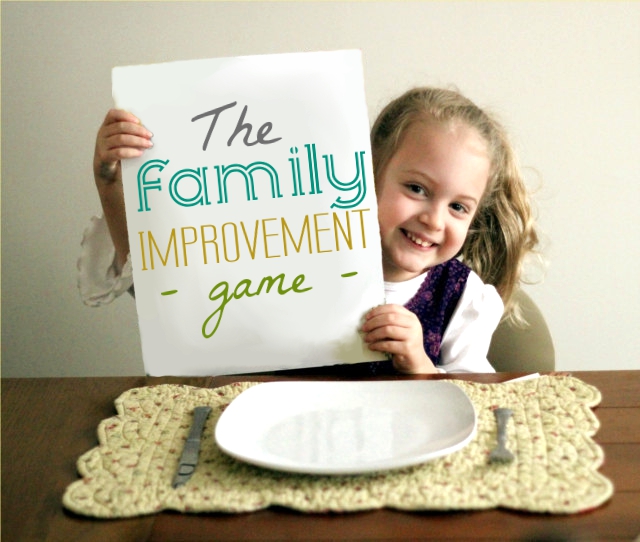I just love the following verse. It’s been awhile since I’ve made any more verse printables, and the principle of this verse is something that we, as a family, have been talking about lately, so I decided to make it into a printable. Plus, I’ve been wanting to tell you about the “Family Improvement Game”, and it just ties in so well …
Openness in family communication is just soooo important. And by openness, I don’t mean just-say-the-first-thing-that-comes-into-your-head-who-cares-if-it-is-kind-or-right … I don’t think that is what this verse is talking about, and is directly opposite of being “quick to hear, slow to speak, slow to anger” (James 1:19). No, by openness I mean that any topic is open to be kindly and lovingly talked about in the family.
Especially when it comes to our individual flaws.
Imperfections. We all have them! Me, you, everyone. (Except God, of course.) Admitting that we make mistakes and that we are, in fact, *gasp!* not perfect .. well, it’s no big surprise is it? We already know that – both about ourselves and others. And the thing is, not talking about and trying to mutually improve our flaws isn’t fooling anyone into thinking we are flawless. It’s kind of like someone who refuses to ever say, “I’m sorry”. Why would we do that? Are we afraid of appearing to be “in the wrong”? Let me let you in on a secret – people can already see that we make mistakes. Refusing to apologize or talk about our mistakes, especially within a family, isn’t hiding anything, it is just adding on to it.
I get kind of tickled, I admit, by how blunt Proverbs is about how we should feel about being corrected and reproved. Proverbs 15:5 says, “whoever heeds reproof is prudent.” But Proverbs 12:1 is even more blunt: “he who hates reproof is stupid.” Hard to get around that one!
My dad has often said that the people who know us best are our families, so how foolish are we if we are not seeking their help and correction on things we need to improve in ourselves! It is interesting that we naturally want this in other areas – for instance, as an Etsy shop owner, I and many others seek out “shop critiques”. Basically, this means that you get a fellow seller to come look at your shop, give you advice, and offer pointers on what you could improve – basically, point out what you are doing wrong. And we want that – we value that! Why? Because we want our shop to become even better, and the first step is to look at what we need to fix. How much more so with our character? And who can see what we need to improve better than our family?

This is how the “Family Improvement Game” got invented. It is something that my family (my parents and siblings) do quite often … and while “game” may be a little bit of a stretch, that is just what we always called it, and it actually is something we enjoyed. We have more recently adopted it in our own family (Tim, Leila, and me), and it has already proven beneficial. Basically, everyone comes to the table knowing they are going to get praise and advice on improvement – and by everyone, I mean everyone! From the littlest kid all the way up to the mom and dad.
First make sure everyone understands that nature of this discussion. It is not a time for attacking, insulting, getting defensive, or getting angry. It is a time where we, as a family, can all lovingly try to help one another. Reading some of Proverbs together first might be a good idea (like Proverbs 25:11, Proverbs 15:1, Proverbs 13:18, Proverbs 15:31, or Proverbs 15:12 … there are many proverbs on this!) No one person is being singled out more than any other. Each person will receive both praise and advice. Here is how it works…
You start with the youngest person in the family – in ours, that would be Leila. Then, going around the room from youngest to oldest, all the other members of the family answer this question in a sentence or two: “What has Leila been doing well at lately?” Things like, “I’ve noticed she has really been good about helping out in the kitchen” or “She has done a great job of sharing her toys when friends come to play”. Then, after everyone has given praise, you go back around the room and each person kindly answers this question in a sentence or two, “What is an area Leila could work on improving?”. For instance, “I think you could do a better job about taking care of your things” or “It would be good to work on having a happier heart when something doesn’t go your way”.
Then, move onto the next youngest. And again, all the other members of the family from youngest to oldest first answer, “What has this person been doing well at lately?” and then “What is an area this person could work on improving?” Then move on to the next person – all the way up to the oldest. Yes, even the youngest child gets to offer what they think the oldest person could improve. It is all to be done in love and respect.
There is one major rule: you are not allowed to defend, get angry or argue with the critiques that are offered to you. You simply take them in and consider what your family has to say. And, if you are wise, you will find plenty to improve in yourself.
A couple little side notes – yes, it can be very humbling when it becomes apparent that everyone, even the smallest child, has noticed your flaw of, for instance, losing your temper. BUT it is very rewarding experience when as you are working on improving, if you play the game a couple weeks later, that same area is mentioned, but this time as an area people are noticed that you are better about. Seeing progress like that is very encouraging. The whole goal of the game is to help each other and improve ourselves. It is about love.
“Better is open rebuke than hidden love.” Proverbs 27:5.
(You can get the printable by clicking the image at the top or by just clicking here.)
How do you encourage openness in your family?



It IS humbling when more than one person offers a similar critique, but you can’t argue with it because it makes it so obvious that it IS something that needs to be improved. Our family has done this several times, but we ought to do it more regularly. It IS valuable.
Ha, yes, it does make that “no arguing” rule even more obvious. ;)
This is such a great post!! I absolutely love the idea of taking time to praise one another and also give some constructive criticism. My family is very open and communicative, but I think having a time each week where we sit down and talk about the things we are all doing well and areas we need to improve would be a great way to make our family even better, and make ourselves better too! I also think such a time where we are free to be open with our feelings in a setting where we don’t have the opportunity to make excuses or get defensive is important. I definitely see us beginning to play the Family Improvement Game too! What a great thing to share! Thank you for this post! :o)
Thanks for your encouraging words, Corrie! It is an idea my dad came up with, and we have definitely benefited from it. :)
This *is* such a good game that our family does — even Amanda and I did a version of it when we were roommates in college. It was usually impromptu — one of us would say, “What is something that you wish I, as a roommate or person, would improve on” which would be followed by a “well, if you could please stop ____ because_____ I would appreciate it. But what is something that you wish I would work on?” … you get the idea? We both knew that sometimes the person started it because they actually did have something that was starting to bother them, but by putting the question on themselves first, it made it easier for the other person to listen and change.
Yes, good point that the principle isn’t limited to families, too!
Well, just be honest, I found this blog while I’m searching some advice about how to design a great blog. And, I found TheFlourishingAbode. Something that amazes me is, the fact that you’re a Christian and you’re showing it on your blog. Takes courage and lots of love to do that. And this post is amazing too, bacause I myself isn’t that open to my family because I’m afraid they’ll get it in the wrong way. Well, because your advice, I think I should talk to them much often. Thanks April!
Aw, thanks Luci! Did you see the blog redesign series I did?
( https://www.theflourishingabode.com/category/challenge/diy-blog-redesign) That is probably why you were lead to my site if your were looking for that type of thing.
I’m glad so you like what you found in this post too. I really appreciate your comment! :)
I love this, and I love your family!
I had heard your Dad talk about this “game”, but I appreciate your sharing it and all of the ground rules here. I think our kids are finally getting old enough to understand and benefit from it. We’ll have to try it very soon.
Yes, Dad often mentions this game in his lessons on home and family. He is the one who came up with it too. I love it. :)
Such a good and beneficial idea! I think we are going to try this one! =)
So glad you liked it, Cheryl! :)
This is a very timely post for me. Somehow, over the last few weeks, we have all gotten into the habit of yelling at one another. I think our two year old started it, hahaha. This will be a great thing to help get us back on track. There is nothing as eye-opening as being humbled by your own child.
So glad you found it encouraging! I hope it will help your family, it has helped ours! :)
Glad you shared this, thanks. One of the interesting things has been how the kids have enjoyed it and requested it. Another thing is how it benefits the whole family, including the parents.
This game has been very helpful for us throughout the years:)
GREAT GAME. I love the character parents must develop through this game in front of their child- a character recognizing flaws and a commitment to continuing to improve so that the children learn that it isn’t a case of “you’re a faulty child and I’m the almighty adult.” It seems parallel to love between husband and wife- the wife is to lovingly submit, not be forced to. All these humble communication promoters must help the leaders lead well and make following a much easier path to see and tread.
I was watching an RSA Animated video about indirect and direct speech- (granted, the discussion is based on an understanding the evolution got us to this point…but…) it discussed the idea that there is a level of intimacy assumed & required to speak about things directly which is why society generally coats speech in euphemisms. We are comfortable in our “I know (I have faults) and you probably know (I have faults), but as long as I don’t know for certain that you know and you don’t know for certain that I know that you know, then we can feel safe that we aren’t overstepping relationship bounds by speaking presumptuously, by saying something that assumes to much intimacy. But with a family, the wife and husband SHOULD be completely intimate- direct speech (as assisted by your game) shouldn’t be a scary step into possibly presumptuous proximity but rather something that one is assured will be taken with love and humility, that the doors of a spouse are open for a relationship where you know and I know and you know that I know and I know that you know and you know that I know that you know ad infinitum. To extend this experience to the child exposes them to the brilliant closeness and safety of marriage. Go April!
I treasure the information on your internet site.
Thank you.
Awesome facts, Many thanks.